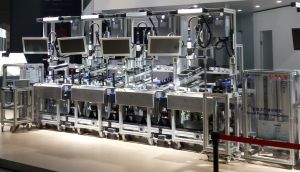Smart machines, workpieces, and processes – this is what the future of German production will be like. The project “Industrie 4.0” (Industry 4.0) launched by the federal government is intended to prepare industry accordingly. China tries to increasingly digitize its industry under the strategy “Made in China 2025” in line with the German model. To prepare companies producing in the People’s Republic of China for the country-specific requirements relating to Industry 4.0, the KIT China Branch has now opened a Demonstration and Innovation Center at Suzhou.
Smart production in line with Industry 4.0 is characterized by a high degree of digital networking for production to enhance its self-organization: “During fabrication, the individual machines recognize automatically which production steps are required. The necessary information comes from e.g. the workpiece carrier via a sensor,” Gisela Lanza, KIT’s Commissioner for the People’s Republic of China and Professor at the Institute of Production Science (wbk), says. “Availability of information in real time allows for the efficient manufacture of customized products by an assembly line.”
Digital networking results in new activities of the staff: “Instead of executing always the same, repeating working steps, man coordinates work in Industry 4.0. The worker reviews the data supplied by assembly stations and workpieces in real time and controls production processes. In this way, he can detect and repair failures at an early stage. In addition, he can react to changes from outside, if, for example, demand increases. To manage these new tasks, it is important for skilled workers to acquire the corresponding qualification.
According to Lanza, China is facing a big challenge: “Production in China is increasingly automated and digitized. However, there are hardly any qualified and accordingly skilled workers to operate these machines correctly.” For the People’s Republic of China to make its industry smart under the strategy of “Made in China 2025”, it would have to invest in the training of skilled workers. This would also applies to German companies producing in China.
For this reason, the KIT China Branch has opened the Industry 4.0 Demonstration and Innovation Center at Suzhou. Here, various institutes and institutions of KIT, such as the Innovation Management Service Unit or the Hector School of Engineering and Management, offer training courses for the staff and executives of companies in China to better manage the challenges of “Industry 4.0” and “Made in China 2025”. Training modules have been conceived to impart to the course participants how processes can be designed more efficiently, assembly lines can be made more flexible, and factory halls can be digitized.
First Center of this Kind to Combine Theory and Practice
The center accommodates a smart assembly line for hydraulic valves. It is based on technology by e.g. Bosch and Bosch Rexroth and can be configured variably. The plant is equipped with various Industry 4.0 applications. By means of a wirelessly controlled smart system, around 90 different valve types can be produced without exchanging tools. Companies can manufacture smaller numbers of pieces at the costs of large-series production. The workpiece carriers are provided with electronic data storage systems containing information on the type of valve to be manufactured by the stations and the materials and working steps needed. Via radio, the carriers transmit these data to the corresponding machines that read them and display information about materials and workflows on a screen in real time for the responsible staff. The workers can now reproduce and control the working steps. The KIT China Branch, Bosch, and Bosch Rexroth presented the assembly line in early November at the China International Industry Fair, one of the biggest fairs on automation in China.
The Demonstration and Innovation Center of the KIT China Branch does not only provide companies with the opportunity to test various settings of the plant and to practically apply knowledge learned during the training. It also serves as a platform for joint projects of Chinese and German scientists of various disciplines. The center is the first of its kind in China, where enterprises and science can test, adjust, and study German Industry 4.0 applications and requirements of a smart factory in a real production line.
China Is an Important Partner for Germany
“For Germany, China is one of the most important sales and procurement markets and, hence, an important economic and strategic partner,” Stefan Ruhrmann, Managing Director of the KIT China Branch, says. Gisela Lanza considers the Demonstration and Innovation Center of the KIT China Branch another milestone for mutual scientific and economic relations: “Only when Germany and China pursue the joint objectives of ‘Industry 4.0’ and ‘Made in China 2025’ together, can both countries profit from each other.”
Since May 2014, KIT has been pooling its research activities with Chinese research and industry partners in the Branch Office at the industrial park of Suzhou (SIP) near Shanghai. “This permanent representation provides direct and uncomplicated access to local partners and their needs,” Ruhrmann explains. Suzhou is a highly suited location, as numerous German industrial companies can be found at the SIP.
In close partnership with society, KIT develops solutions for urgent challenges – from climate change, energy transition and sustainable use of natural resources to artificial intelligence, sovereignty and an aging population. As The University in the Helmholtz Association, KIT unites scientific excellence from insight to application-driven research under one roof – and is thus in a unique position to drive this transformation. As a University of Excellence, KIT offers its more than 10,000 employees and 22,800 students outstanding opportunities to shape a sustainable and resilient future. KIT – Science for Impact.

